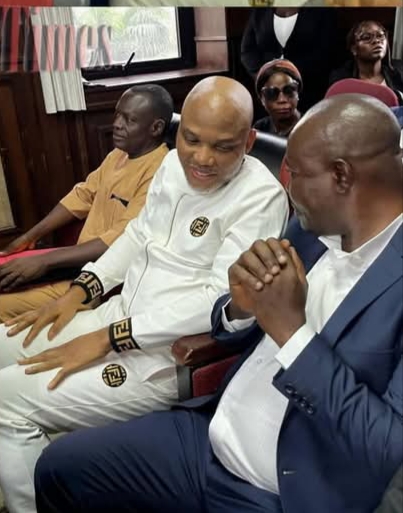Crime & Law
Nnamdi Kanu : Appeal Court asked to set aside Abuja court ruling over ‘grave legal errors’

A human rights lawyer, Mr. Christopher Chidera, has faulted the recent decision of Justice James Kolawole Omotosho of the Federal High Court in Abuja, insisting that the ruling in the case against Indigenous People of Biafra (IPOB) leader, Nnamdi Kanu, is riddled with inconsistencies and undermines the rule of law.
Justice Omotosho had on Friday declared that Kanu has a case to answer on terrorism-related charges, despite what critics describe as serious flaws in the prosecution’s evidence.
Reacting in a media statement, Chidera said the judgment “departs sharply from established legal principles and underscores a troubling trend of prioritising executive interests over justice in Nigeria’s courts.”
The lawyer accused the judge of concentrating solely on the charge sheet while ignoring the weaknesses exposed in the prosecution’s evidence during cross-examination. He noted that such an approach runs contrary to Supreme Court precedents, which require trial judges to determine whether prosecution witnesses have been discredited.
Chidera also faulted the court for permitting charges to be pursued under the repealed Terrorism Prevention (Amendment) Act 2013. According to him, “Prosecuting under a defunct statute is not a mere technicality — it renders the entire case a legal nullity. Section 122 of the Evidence Act 2011 obliges courts to take judicial notice of repealed laws.”
READ ALSO:IPOB : Abuja court gives verdict on Nnamdi Kanu’s no-case submission
He argued further that the ruling contravenes Section 36(11) of the 1999 Constitution, which protects citizens from self-incrimination. By declaring that Kanu “has a case to answer,” Chidera said the court has effectively shifted the burden of proof from the state to the accused.
“Collectively, these errors reveal a disturbing pattern: the judiciary in Abuja appears more committed to sustaining a politically motivated trial than upholding justice. Courts must serve as impartial arbiters, not as instruments of executive will,” he maintained.
Chidera urged the Court of Appeal to urgently revisit the judgment and correct what he called “egregious legal errors.” He also called on the Nigerian Bar Association (NBA) and the National Judicial Council (NJC) to investigate recurring lapses in judicial procedure in the case.
Beyond Nigeria, the lawyer appealed to the international community to closely monitor the proceedings, arguing that the government’s handling of Kanu’s trial violates obligations under the International Covenant on Civil and Political Rights (ICCPR) and the African Charter on Human and Peoples’ Rights.
The ruling, critics say, raises fresh concerns about the impartiality of Nigeria’s courts and the country’s commitment to upholding fair trial standards.






















